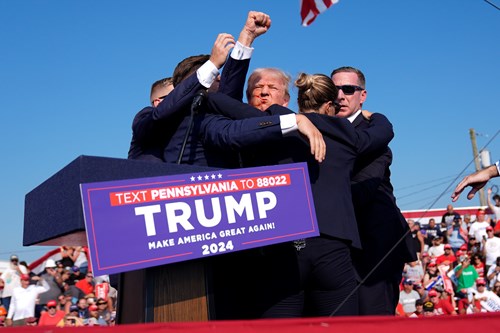Judicial Watch has obtained more than 300 pages of Secret Service records that show the agency has made diversity, equity, and inclusion (DEI) the centerpiece of its corporate mission. According to those records, the USSS has an internal mandate that 12% of its workforce must be composed of people with either physical or mental disabilities. That mandate applies to every action of the agency, including assigning details to protect government leaders.
According to Judicial Watch, those records reveal the USSS has made it a top priority that "diversity and inclusion is not just 'talked about' – but demonstrated by all employees through 'Every Action, Every Day.'"
Judicial Watch obtained the records in a FOIA lawsuit (freedom of information request) against the Department of Homeland Security.
Unearthing the impact of DEI
A panel of Republican congressmen determined to get to the bottom of the Secret Service failures of July 13 in Butler, Pennsylvania, met at The Heritage Foundation in Washington, DC, to talk to some experts. Republicans Andy Biggs, Eli Crane, Matt Gaetz, Cory Mills, and Chip Roy don't think the bipartisan committee to investigate the attempted assassination of Donald Trump is getting results fast enough, so they convened a forum with experts in personal protection. One of those experts was podcaster and former Secret Service agent Dan Bongino.
 Cong. Cory Mills (Florida) said DEI has no place in any business, much less protecting the President of the United States. "The idea of DEI – and again, I always say DEI equals DIE or stands for 'Didn't Earn It' – we have to get back to meritocracy and to making sure that the very best are there," he stated.
Cong. Cory Mills (Florida) said DEI has no place in any business, much less protecting the President of the United States. "The idea of DEI – and again, I always say DEI equals DIE or stands for 'Didn't Earn It' – we have to get back to meritocracy and to making sure that the very best are there," he stated.
Rep. Eli Crane of Arizona argued DEI was likely to blame when one of the agents assigned to protect Trump in Butler seemed lost when taking care of Trump. "When I saw the female agent struggle to holster her weapon three different times, I was thinking to myself, 'Are you serious right now?' Maybe one miss and a little play."
Cong. Andy Biggs, also from Arizona, says that wasn't the only indicator of DEI run amok during the shooting. "You literally had people on the stage going, 'What do we do? What do we do?'
"That right there is a huge issue for me," Biggs continued, "because when you know you're trying to get off the X, the first thing that you're looking at is that you've already either identified a safe room or you got your rolling motorcade which is a rolling hard room."
'Grade-school level politics'
When asked by the panel of GOP lawmakers to assess the actions of the Secret Service, Bongino identified three things, organizationally, he contends have to change at the agency.
"First, they have a technology problem. Second, the more-with-less approach. There is no more with less – there's less with less, okay? Third, their agents can figure out how to do protection without running out cheap $20 counterfeit notes at 7-11 on a Friday night while the president is getting shot in the head."

Bongino said the Trump detail had complained to management that it needed more agents and assets. Those requests, he said, were routinely denied because, in his opinion, the agency has been politicized and strongly opposes the GOP presidential candidate.
"I absolutely believe Donald Trump and an enhanced security posture he should have had would have made him look more presidential," Bongino explained. "And they were making some of these decisions based purely on grade school-level politics."
Rep. Mills was even more to the point. "You will see at this stage where I think that criminal gross negligence and purposeful intent will be indistinguishable," said the Florida lawmaker.
Cong. Matt Gaetz, also from Florida, asked if appropriate changes were being made:
Gaetz: "Mr. Bongino, in your opinion, is the Secret Service in a better spot today with Director [Ronald] Rowe in charge?"
Bongino: "No, it's worse. And sadly, I'm glad this is all being recorded because when something else happens – and I hope it doesn't – if you think this is the last incident, you're out of your mind."
"With respect to the mission of the Secret Service, if DEI dictates outcome or incentivizes an outcome other than selecting the very best candidates for hire or moving the best people into internal positions, then DEI is an impediment to the mission of the Secret Service." (Ken Valentine, retired Secret Service agent)
Thumbs up: Agents suspended
Meanwhile, members of a bipartisan Trump Assassination Task Force descended on Butler, Pennsylvania, on Monday to meet with local law enforcement as part of its probe into the July 13 assassination attempt on former President Trump during a rally in that rural community.
 Lawmakers believe the Secret Service continues to "slow walk" information about that day – and last week, the agency put five agents on leave. Four work out of the Pittsburgh Field Office, including the head of the division; and the fifth was assigned to Trump.
Lawmakers believe the Secret Service continues to "slow walk" information about that day – and last week, the agency put five agents on leave. Four work out of the Pittsburgh Field Office, including the head of the division; and the fifth was assigned to Trump.
Ken Valentine served 24 years with the Secret Service, including 10 years with the Presidential Protection detail. He tells AFN the suspensions were a good idea.
"I think the move to put those high-profile members of the advance team and those involved with the buildup or the advance of President Trump's visit on July 13 is probably wise," he shares.
"So much of what the Secret Service does is in the public view, despite the name; and when you have multiple investigations ongoing, it's wise to take those whose actions are being investigated out of public service until they get the necessary clarity to either exonerate them or to discipline them."
Valentine argues that the Department of Homeland Security bears some responsibility in this case.
"They have direct oversight of the Secret Service, and they're the ones who installed that director [who was suspended]. They're the ones who dictate so much of the policy that the Secret Service has to exist under as part of DHS," says Valentine.
"Once they figure out exactly what happened in Butler, let's go back and find out what's been happening at the Secret Service since they've been under the purview of the Department of Homeland Security."
The retired Secret Service agent contends the agency should go back to being part of the U.S. Treasury Department.







